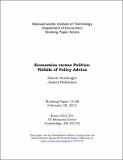| dc.contributor.author | Acemoglu, Daron | |
| dc.contributor.author | Robinson, James | |
| dc.date.accessioned | 2013-06-05T20:24:31Z | |
| dc.date.available | 2013-06-05T20:24:31Z | |
| dc.date.issued | 2013-06-05 | |
| dc.identifier.uri | http://hdl.handle.net/1721.1/79064 | |
| dc.description.abstract | The standard approach to policy-making and advice in economics implicitly or explicitly ignores politics and political economy, and maintains that if possible, any market failure should be rapidly removed. This essay explains why this conclusion may be incorrect; because it ignores politics, this approach is oblivious to the impact of the removal of market failures on future political equilibria and economic efficiency, which can be deleterious. We first outline a simple framework for the study of the impact of current economic policies on future political equilibria and indirectly on future economic outcomes. We then illustrate the mechanisms through which such impacts might operate using a series of examples. The main message is that sound economic policy should be based on a careful analysis of political economy and should factor in its influence on future political equilibria. | en_US |
| dc.language.iso | en_US | en_US |
| dc.publisher | Cambridge, MA: Department of Economics, Massachusetts Institute of Technology | |
| dc.relation.ispartofseries | MIT Department of Economics Working Paper Series;13-08 | |
| dc.subject | economic policy | en_US |
| dc.subject | market failures | en_US |
| dc.subject | policy advice | en_US |
| dc.subject | political economy | en_US |
| dc.subject | politics | en_US |
| dc.title | Economics versus Politics: Pitfalls of Policy Advice | en_US |
| dc.type | Working Paper | en_US |
